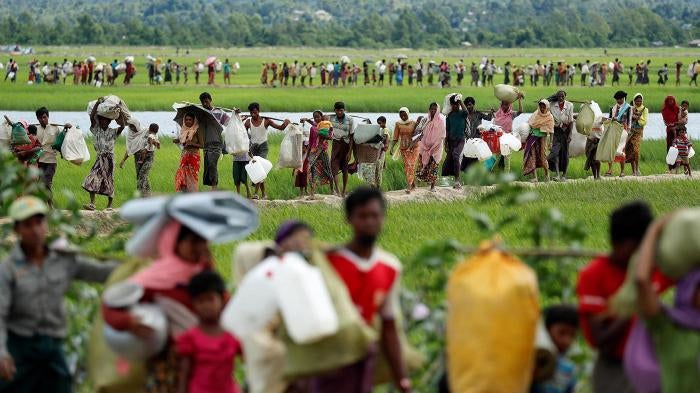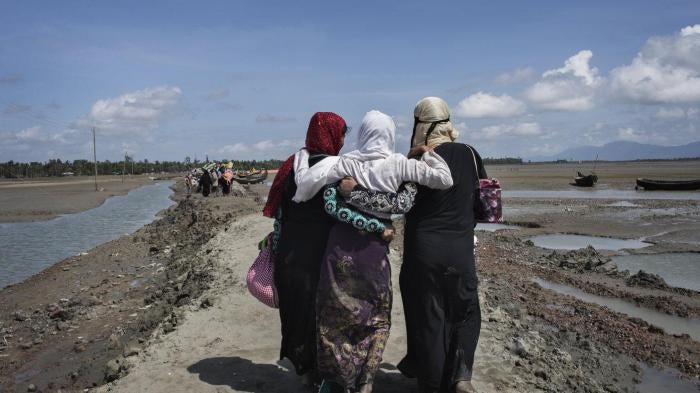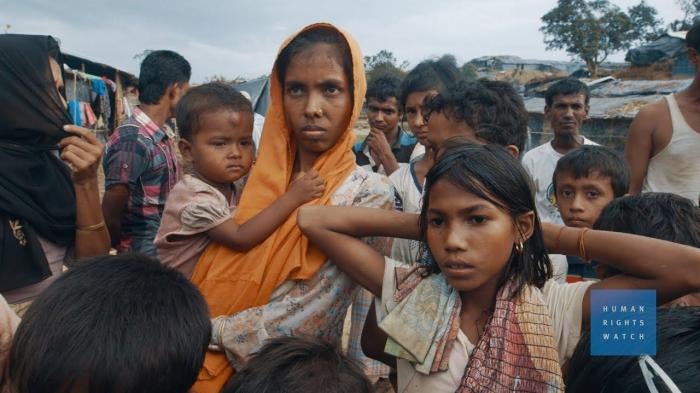Burma’s stalled democratic transition gave way to a massive human rights and humanitarian crisis starting in August 2017, when the military launched a large-scale ethnic cleansing campaign against the Rohingya Muslim population in Rakhine State. More than 650,000 Rohingya have fled to neighboring Bangladesh to escape mass killings, sexual violence, arson, and other abuses amounting to crimes against humanity by the security forces.
2017 marked the country’s first full year under the democratically elected civilian government led by the National League for Democracy (NLD) and de facto civilian leader Aung San Suu Kyi. The NLD-led government took some positive steps, including ratifying the International Covenant on Economic, Social and Cultural Rights, engaging in some efforts to resolve past land confiscation cases, and enacting minor reforms to laws regulating speech and assembly. However, the government increasingly used repressive laws to prosecute journalists, activists, and critics for peaceful expression deemed critical of the government or military.
Despite the appearance of civilian rule, the military remained the primary power-holder in the country. It continued to block efforts to amend the 2008 constitution, which allows the armed forces to retain authority over national security and public administration through control of the defense, home affairs, and border affairs ministries. The constitutional provision allowing the military to appoint 25 percent of parliamentary seats affords it an effective veto over constitutional amendments.
The peace process with ethnic armed groups made no meaningful progress. Fighting intensified in Kachin and northern Shan States, resulting in an increase in forced displacement and other abuses against civilians, primarily by government forces.
Crimes Against Humanity and Ethnic Cleansing of Rohingya
On August 25, in response to coordinated attacks on security force outposts northern Rakhine State by militants from the Arakan Rohingya Salvation Army (ARSA), security forces launched a large-scale military operation against the Rohingya Muslim population.
Military units, assisted by ethnic Rakhine militias, attacked Rohingya villages and committed massacres, widespread rape, arbitrary detention, and mass arson. Some Rohingya who fled were killed or maimed by landmines laid by soldiers on paths near the Bangladesh-Burma border. Satellite imagery showed that more than 340 primarily Rohingya villages were either substantially or completely destroyed.
Prior to August 25, the total Rohingya population in Burma was estimated to be more than 1 million, though precise figures do not exist as the Rohingya were excluded from the 2014 census. An estimated 120,000 Rohingya remain internally displaced in central Rakhine State from waves of violence in 2012. The military and government have denied that the Rohingya are a distinct ethnic group, effectively denying them citizenship, and calling them “Bengali” instead of “Rohingya” to label them as foreigners.
The military and government appointed multiple investigative commissions on the 2016-2017 violence, but each engaged in whitewashing, denying any unlawful killings. The Burmese government repeatedly stated it would not grant access to members of a United Nations Fact-Finding Mission, created by the UN Human Rights Council (UNHRC) in March 2017 following attacks on the Rohingya in late 2016.
In December 2017, the UN General Assembly passed a resolution urging Burma to give the mission full, unrestricted, and unmonitored access. The government denied access to affected areas in Rakhine State to independent journalists and human rights monitors. It also continued to heavily restrict access to humanitarian agencies, compounding the already-dire humanitarian conditions that internally displaced people (IDP) and other residents face.
Ethnic Conflicts and Forced Displacement
As the peace process stalled, fighting between the military and ethnic armed groups continued over the year in Kachin and northern Shan States, with civilians endangered by indiscriminate attacks, forced displacement, and blockage of aid by the government. Approximately 100,000 civilians remain displaced in camps in the region, many near areas of active conflict, heightening their vulnerability.
In March, fighting broke out in the Kokang region of Shan State when the Myanmar National Democratic Alliance Army (MNDAA) attacked military posts and casinos in Laukkai. Over 20,000 temporarily fled across the border into China, and about 10,000 were displaced to central Burma. In June, fighting escalated in Tanai township in Kachin State, displacing thousands. Sporadic fighting in Chin State with the Arakan Army, comprised of ethnic Rakhine Buddhists, endangered civilians, forcing hundreds from their homes.
Reports rose of injuries and deaths caused by landmines, used by both government and ethnic armed forces. Landmine casualties in Burma over the past decade are the third highest in the world. Both government and ethnic armed groups unlawfully recruited children for their forces. The government did not adequately or effectively investigate alleged abuses by military personnel in conflict areas.
Attacks on Free Expression and Media
The government increased its use of overly broad and vaguely worded laws to detain, arrest, and imprison individuals for peaceful expression. Activists and journalists reported an increase in surveillance, threats, and intimidation by security personnel or their agents. The rise in prosecutions of journalists has had a chilling effect on the country’s media.
Prosecutions for critiques of government or military officials have surged since the NLD took office. Over 90 cases have been filed under section 66(d) of the 2013 Telecommunications Act, a vaguely worded law that criminalizes broad categories of online speech, with over 20 journalists among those charged.
In September, after parliament rejected a proposal to remove the law’s criminal penalty, President Htin Kyaw signed into law amendments to the act that reduced the maximum prison sentence from three to two years and allowed for bail, but the majority of problematic provisions were retained.
In January 2017, the army filed defamation charges under section 500 of the penal code against nine students who performed a satirical play about armed conflict at a peace assembly in Irrawaddy Region. A local human rights defender was charged under section 66(d) in June for streaming a video of the play on Facebook. The chief editor of Myanmar Now, Swe Win, was arrested in July under section 66(d) for a Facebook post criticizing extremist Buddhist monk Wirathu. He was released on bail but has faced extensive pretrial delays.
Khaing Myo Htun, an environmental rights activist, was sentenced to 18 months in prison in October for violating sections 505(b) and (c) of the penal code, which criminalizes speech that is likely to cause fear or harm and incites classes or groups to commit offenses against each other. He had been detained since July 2016 for helping prepare a statement released by the Arakan Liberation Party, of which he was the deputy spokesperson, accusing the military of rights violations.
The Voice newspaper’s chief editor Kyaw Min Swe and columnist Kyaw Zwa Naing were arrested in June under section 25(b) of the 2014 Media Law and section 66(d) of the Telecommunications Act for an article satirizing a military propaganda film, despite having printed an apology in May. Later that month, three journalists—Aye Nai and Pyae Phone Naing from the Democratic Voice of Burma (DVB), and Lawi Weng from The Irrawaddy—were detained under section 17(1) of the 1908 Unlawful Associations Act while reporting on an event organized by the Ta’ang National Liberation Army (TNLA), an ethnic armed group, in northern Shan State. After a domestic and international outcry, the charges were dropped.
The government has long used the Unlawful Associations Act to restrict freedom of association and detain peaceful activists. In October, authorities sentenced two Kachin Baptist community leaders, Dumdaw Nawng Lat and Langjaw Gam Seng, to four years and two years in prison, respectively, under section 17(1). The two men were charged with allegedly supporting the Kachin Independence Army (KIA) after they assisted journalists documenting military damage to civilian areas in northern Shan State.
Despite changes to the Peaceful Assembly and Peaceful Procession Act, the right to protest is still limited. In October, the law was amended to remove the requirement of government consent to hold an assembly or processions, yet it retains several provisions that fail to meet international standards. The police announced in November a total ban on all public assemblies in 11 major townships in Rangoon.
A new privacy law enacted in March includes vague provisions on surveillance and data protection.
Religious Freedom
Religious minorities, including Hindus, Christians, and Muslims, continue to face threats and persecution in a country that is approximately 88 percent Buddhist. Religious activities are often tightly regulated and authorities threaten to fine or imprison those who conduct organized prayers in their homes.
In May, authorities sent a letter to a Christian man in Rangoon, warning him not to continue to pray in his home with others without first receiving approval from authorities. In Sagaing Region, a Buddhist mob attacked Christian worshippers, destroying homes and personal property.
The government took increasing action against Buddhist monks and organizations that used extremist and ultranationalist rhetoric. In May, the government banned the use of the name and logos of the Buddhist-monk-led Ma Ba Tha, or Association for the Protection of Race and Religion. Some but not all branches of the organization complied. A well-known extremist monk, Wirathu, was banned from public speaking for one year, but has on occasion violated the order without consequences.
In April, a mob of about 50 to 100 Buddhist ultranationalists put pressure on local officials and police in Rangoon’s Thaketa township to close two Islamic schools. The authorities carried out the mob’s demand and have not reopened the schools, denying several hundred students access to education. Following the closures, local officials charged seven Muslims who participated in a public prayer session on May 31. They faced up to six months in jail for holding public prayers under the Ward or Village Tract Administration Law.
Attacks on Human Rights Defenders
Accountability for attacks on human rights defenders remains impeded by the country’s weak rule of law, corrupt judiciary, and unwillingness to prosecute members of the security forces.
On January 29, Ko Ni, a prominent Muslim lawyer and senior NLD advisor, was shot and killed outside the Rangoon airport. Ko Ni, a longtime advocate for interfaith dialogue and democratic reform, had been a proponent of controversial legislation including a hate speech bill and constitutional amendments. Authorities arrested four suspects, but have not apprehended the individual alleged to have engineered the attack. Aung San Suu Kyi was widely criticized for her silence after the killing.
Three recent murders of environmental defenders—rights activist Naw Chit Pandaing and investigative journalist Soe Moe Tun in late 2016, and community leader Lung Jarm Phe in February 2017—remain unsolved.
On November 1, a land rights defender in northern Shan State, Htay Aung, was killed by a mob while on his way to discuss a dispute over confiscated land.
Land Rights and Government Land Seizures
The government took several steps toward reforming land laws that provide weak land tenure security for farmers and toward resolving decades-old claims of land confiscation that occurred under military rule.
However, progress was limited as attempts to reform laws and land governance structures failed to provide additional protections for landholders and did not incorporate provisions of the 2016 National Land Use Policy. Farmers faced threats and arrests for protesting about unresolved land confiscation claims. Poor redress mechanisms left many without a livelihood or compensation and facing increased barriers to health care and education.
Human Trafficking
Human trafficking remained a serious problem in several areas, particularly in the north where armed conflict and widespread displacement exacerbated financial instability. Women and girls in Kachin and Shan States who went to China in search of work faced abuses. Many women and girls were sold to Chinese families as “brides” and often faced horrific abuses including being locked up, subjected to sexual slavery, forced to bear children of their “husbands” by rape, and forcibly separated from their children. The Burmese government put few measures in place to protect women and girls from these abuses or assist women and girls who escaped or sought to do so.
Key International Actors
China continued to strengthen its ties with Burma, shielding the Burmese government from concerted international action and scrutiny over the Rohingya crisis. Large-scale infrastructure projects ramped up under China’s “One Belt, One Road” initiative, including an eastern seaport development that offers strategic access to the Indian Ocean.
China attempted to play a larger role in Burma’s peace process through ties to ethnic armed groups on the border. In November, China served as a mediator for talks between Burma and Bangladesh on the return of Rohingya refugees, but the resulting agreement failed to meet international standards for the protection and respect of rights of refugees.
Burma’s civilian government continued to receive strong backing from Western donors, who remained hopeful about the reform process yet concerned about weak governance and the increased role and stature of the military.
In response to the Rohingya crisis, in September the UN Security Council held its first open discussion of the situation in Burma in eight years. A draft Security Council resolution was blocked by a veto threat from China. Instead, in November it adopted a Presidential Statement expressing grave concern over reports of human rights violations in Rakhine State by Burma’s security forces and calling on Burma to cooperate with UN investigative bodies.
In December, the UN General Assembly adopted a resolution drafted by the Organisation of Islamic Cooperation (OIC) and co-sponsored by a broad cross-regional coalition that called for an end to military operations, unhindered access for humanitarian assistance and actors, the voluntary and sustainable return of refugees to their original places, accountability for violations and abuses, and full respect for the “human rights and fundamental freedoms” of the Rohingya population, including full citizenship. The resolution also requested the appointment of a special envoy to Burma.
In December, the UNHRC held a special session condemning the violations, urging the government to grant access to the council-created Fact-Finding Mission, and calling on the government to address root causes, such as statelessness and the denial of citizenship to Rohingya. The council said that returns should be safe, voluntary, dignified, and in accordance with international law, and requested additional reporting by the UN High Commissioner for Human Rights.
While Burma faced widespread international condemnation for the military’s ethnic cleansing of the Rohingya, concrete action was less forthcoming. In September, the United Kingdom announced it was halting all engagement programs with the Burmese military. In October, the European Union suspended invitations to senior military officers and undertook a review of defense cooperation. The United States ceased consideration of travel waivers for current and former senior military officials and rescinded invitations for senior military officials to attend US-sponsored events. In October, citing the crisis in Rakhine State, the World Bank announced it would delay a loan for US$200 million, its first direct financial assistance to the government’s budget since the institution suspended its lending to the country in the late 1980s.
The US government removed Burma from its annual list of governments using child soldiers, despite documentation of ongoing recruitment. Burma remains on the UN’s annual “list of shame” for the military’s use and recruitment of child soldiers. The US also upgraded Burma’s designation in its global Trafficking in Persons (TIP) Report, despite continued violations and weak efforts by the government to end trafficking and punish those responsible.







